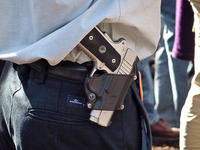-
Olof Palme's killer is still alive
One of the greatest mysteries in post-Second World War Europe may be a step closer to resolution; on 28 February 1986, Swedish prime minister Olof Palme was shot and killed while strolling down a busy Stockholm street with his wife Lisbet; despite tens of thousands of tips and leads in the almost twenty-four years since the crime, the murder has never been solved, and the weapon, a .357 Magnum revolver, has never been found
-
-
Boom in Pakistan's private security industry
Pakistan’s deteriorating law and order has led to a boom in the private security industry in the country; companies are investing millions of dollars to train and update their security operations; an estimated 30,000 private security guards have found employment with 400 private security agencies that have sprung up in Pakistan in recent years
-
-
New scanner allows distant fingerprint reading
A prototype scanning device can scan fingerprints from up to two meters away, an approach that could prove especially useful at security checkpoints in places like Iraq and Afghanistan; the scanner detects fingerprints by shining polarized light onto a person’s hand and analyzing the reflection using two cameras configured to detect different polarizations; in addition to checkpoints in the field, the device could make authorization more efficient in lots of settings: instead of punching a keypad code or pressing fingers to a scanner, individuals could simply hold up a hand and walk toward a security door while the device checks their identity
-
-
Police want UAVs for domestic surveillance
Police agencies around the United States soon could be using UAVs for law enforcement missions such as finding lost children, hunting illegal marijuana crops, and easing traffic jams in evacuations of cities before hurricanes or other natural disasters; local governments have been pressing the Federal Aviation Administration (FAA) for wider use of UAVs — a demand driven largely by returning veterans who observed the crafts’ effectiveness in war
-
-
Lawmakers looking to cash-strapped local police for extra security

For members of Congress worried about their safety in the wake of the Arizona mass shooting, relying on local law enforcement may not be an option as cutbacks hit cash-strapped police forces; Rep. Jesse Jackson Jr. (D-Illinois) this week proposed additional congressional spending for security at district offices; Rep. Peter King (R-New York) proposed barring people from bringing a weapon within 1,000 feet of a government official; Rep. Louie Gohmert (R-Texas) suggested allowing lawmakers to carry weapons inside the Capitol; already, Reps. Jason Chaffetz (R-Utah) and Heath Shuler (D-North Carolina) announced they are going to step up the frequency with which they carry concealed weapons to district events
-
-
U.K. joins European fingerprint database
Home Office joins Eurodac fingerprint database, which collects the fingerprints of asylum seekers and some illegal entrants to the European Union; Eurodac consists of a Central Unit within the European Commission, equipped with a computerized central database for comparing fingerprints, and a system for electronic data transmission between EU countries and the database
-
-
Move to strengthen Capitol security in wake of Arizona shooting

Representative Dan Burton (R-Indiana) intends to introduce legislation similar to a measure he presented in 2007 to enclose the House Chamber in a “transparent and substantial material” to prevent people from tossing explosives or shooting onto the floor; since the 1 March 1954 attack on Congress — four Puerto Rican nationalists entered the House visitors’ gallery and fired nineteen shots at members and staff during a vote — and several others involving firearms and explosives, the Capitol has strengthened its security apparatus; it now screens all visitors at an underground security checkpoint located in the Capitol Visitor Center. People who want to watch House and Senate floor proceedings from a visitors’ gallery have to go through an additional set of metal detectors before entering the chamber
-
-
Rep. Clyburn calls for increased spending on lawmakers' safety
After the shooting of Representative Gabrielle Giffords, Representative James Clyburn called for increases in spending to protect lawmakers; the House voted last week to reduce its operating budget by 5 percent; Congressional security officials are currently reviewing security measures and briefing members and their staffers on security
-
-
Officials warn of Arizona copycat attacks

Intelligence and law enforcement authorities informed U.S. lawmakers that they are monitoring for potential “copycat” attacks on lawmakers after the rampage in Arizona on Saturday; Rep. Peter King, chairman of the House Homeland Security Committee, said he expects to ask for a formal report on the shooting, addressing both the short-term concerns — including the likelihood of copycat incidents — and long-term issues with security; among the questions he wants answered, King said, are “Is this part of a larger movement? Is there any evidence he [the assailant] was motivated by organizational structure?” FBI director Robert Mueller said: “Given this tragedy, all logical precautions are in place to best ensure the safety of other public officials, but there is no information at this time to suggest any specific threat remains”
-
-
Miami Police first to use UAVs in a U.S. city
The Miami-Dade Police Department could soon become the first police department in the country to employ unmanned drones; the department acquired two T-Hawk Micro Air Vehicles, manufactured by Honeywell, in August 2009, and has been testing and training with them since; it is now in the third phase of a three-phase testing program, and plans to apply soon to the FAA for final approval to use the drones in operations
-
-
California police use electric motorcycles
The Scotts Valley Police Department is the first law enforcement agency in California to accept delivery of a Zero DS electric motorcycle; it will be a benchmark for evaluating the performance capabilities of the Zero DS in law enforcement situations, such as responding through traffic and on local bike trails
-
-
Ashland, Alabama, police adopts new technology
Six years ago there was one computer in the Ashland, Alabama, Police Department; Several grants and nearly $300,000 later, officers are typing up reports on in-car computers, scanning fingerprints, and instantly checking for matches with other police departments around the state
-
-
Quick Heal introduces technology to track laptops
New laptop tracking technology will help Indian police track and locate stolen laptops across the country; Quick Heal, the company offering the technology, also aims to create a centralized database of lost or stolen laptops; the database will be accessible to retailers and consumers
-
-
New laser weapon dazzles, confuses pirates
There were 430 pirate attacks last year, an increase of 5.6 percent on the previous year; in a bid to develop a suitable non-lethal weapon to help fend off this threat, BAE Systems studied pirate behavior; the conclusion was that an automatic weapon was needed, one that would not put any of the crew at risk, and one which would distract suspected pirates rather than harm them
-
-
South African wireless traffic lights stolen by SIM-card thieves
The city of Johannesburg had a great idea to make traffic move more smoothly in the city: install wirelessly activated traffic lights; but this is South Africa, so it did not take more than a few weeks for thieves to steal the SIM cards from 400 out of the 600 traffic lights installed; now the city does not have the fancy lights — and it pays thousands of rand on phone calls the thieves subsequently make using the snaffled SIMs
-
- All
- Regional
- Water
- Biometrics
- Borders/Immig
- Business
- Cybersecurity
- Detection
- Disasters
- Government
- Infrastructure
- International
- Public health
- Public Safety
- Communication interoperabillity
- Emergency services
- Emergency medical services
- Fire
- First response
- IEDs
- Law Enforcement
- Law Enforcement Technology
- Military technology
- Nonlethal weapons
- Nuclear weapons
- Personal protection equipment
- Police
- Notification /alert systems
- Situational awareness
- Weapons systems
- Sci-Tech
- Sector Reports
- Surveillance
- Transportation
Advertising & Marketing: advertise@newswirepubs.com
Editorial: editor@newswirepubs.com
General: info@newswirepubs.com
2010-2011 © News Wire Publications, LLC News Wire Publications, LLC
220 Old Country Road | Suite 200 | Mineola | New York | 11501
Permissions and Policies
Editorial: editor@newswirepubs.com
General: info@newswirepubs.com
2010-2011 © News Wire Publications, LLC News Wire Publications, LLC
220 Old Country Road | Suite 200 | Mineola | New York | 11501
Permissions and Policies
